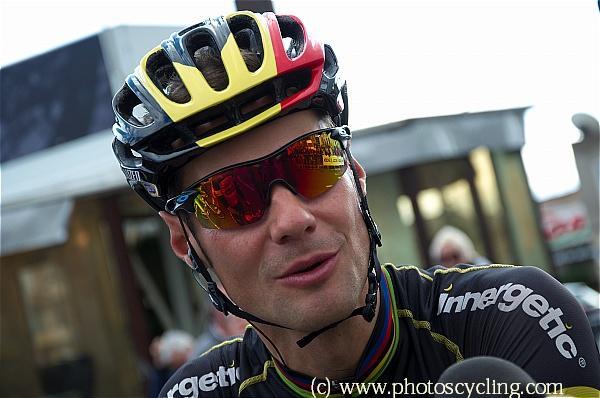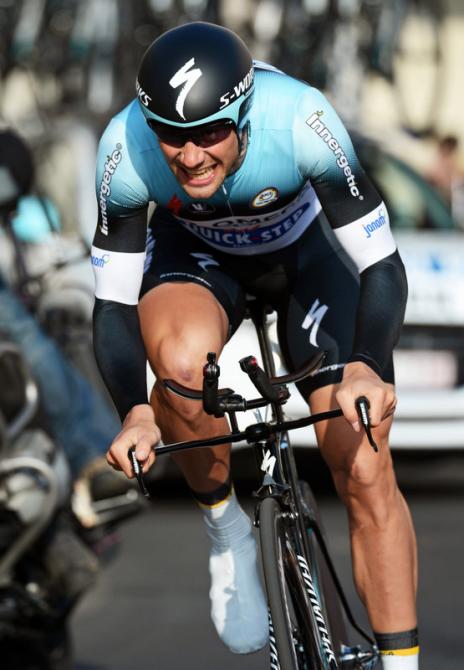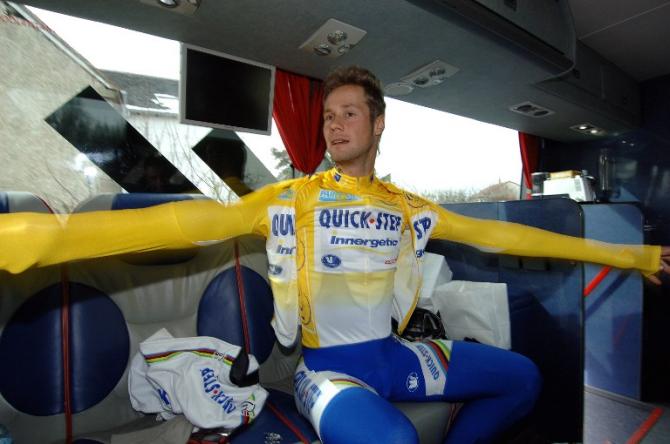Boonen limits expectations at Milan-San Remo
Belgian making up for time ahead of cobbled classics



Tom Boonen’s combination of endurance and finishing speed seems the embodiment of the qualities required by a Milan-San Remo winner, yet success on the Italian Riviera has always eluded him, with podium finishes in 2007 and 2010 the best he has to show from 10 appearances in the race.
Speaking to reporters in Cinisello Balsamo on Friday evening, Boonen downplayed his chances of breaking his Milan-San Remo hoodoo this time around also, and insisted that his principal aim for the 300km race is simply to build his condition for the cobbled Classics after a troubled off-season.
Winner of the Tour of Flanders, Paris-Roubaix and Gent-Wevelgem last spring, Boonen’s annus mirabilis was followed by the health problems that plagued his winter. First, he was laid low by an intestinal infection in December and, more seriously, surgery on an elbow infection delayed the beginning of his 2013 campaign, but after grinding his way through a tough Paris-Nice, Boonen is hopeful that perhaps he is himself again.
“It’s the next step in the evolution,” Boonen said of Milan-San Remo. “It’s not the biggest objective of the Spring Classics, but I’d like to do a good race on Sunday. I’m starting to feel good and feel my normal self again and it’s about time, eh?
“I have no goals set up but I’ll just try to do as good as possible. It will already be a very successful race if I pass the Poggio with the first group, but of course in the back of your mind, you’re thinking about a little bit more and I have good memories of this race.”
Boonen acknowledged, however, that achieving a little bit more is a rather big ask given the presence of the in-form Peter Sagan (Cannondale). The Slovak is the firm favourite to triumph on the Lungomare Italo Calvino on Sunday, and Boonen nodded in agreement with his stable-mate Mark Cavendish’s frank assessment that it would take a miracle to stop Sagan.
“I have some good memories of this race but I don’t think we have to kid ourselves: with Sagan in this race, it will be very hard to win,” he said. “We’re still thinking about a good tactic for Sunday.”
Get The Leadout Newsletter
The latest race content, interviews, features, reviews and expert buying guides, direct to your inbox!
The endless tactical permutations of Milan-San Remo – the easiest Classic to finish and the hardest to win, according to the adage – make it the most unpredictable race of the spring, and another volatile element looks set to be added to the mix on Sunday, with rain and low temperatures forecast, and even a possibility of snow on the Turchino Pass.
Belying his status as a Flandrian hard man, Boonen insisted that he “would prefer nice weather, I don’t like the rain at all,” although he seemed to take a certain delight in describing the expected war of attrition. “If the weather is going to be like they say it is – six degrees [Celsius] and rain – then 50 percent of the riders are going to be eliminated already and from the 50 percent that’s still in the race, another 50 percent will crash, and then there’s not much left, eh?”
Being amongst the last men standing in those conditions would constitute an important sign of progress for Boonen ahead of the Holy Week of the Tour of Flanders and Paris-Roubaix, although he reiterated that his chances of victory are limited, admitting that only on one occasion in the past has he squandered a genuine opportunity to win the race, when he finished third behind Oscar Freire in 2007.
“That year I really had the legs to win it but the other years, I got the right spot,” Boonen said. “When I got second [in 2010], Freire was stronger. I was beaten on my value every year. It’s a very hard race to win. You either have to be fastest in the sprint, the best descender, or the strongest on the climb and until now, I have never been one of those three things."

Barry Ryan was Head of Features at Cyclingnews. He has covered professional cycling since 2010, reporting from the Tour de France, Giro d’Italia and events from Argentina to Japan. His writing has appeared in The Independent, Procycling and Cycling Plus. He is the author of The Ascent: Sean Kelly, Stephen Roche and the Rise of Irish Cycling’s Golden Generation, published by Gill Books.